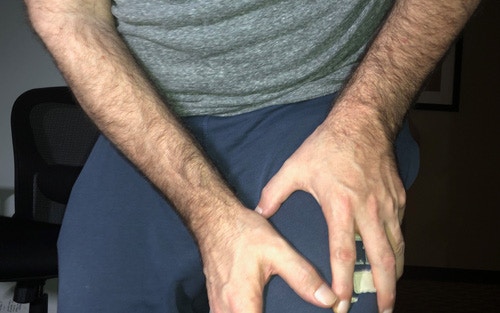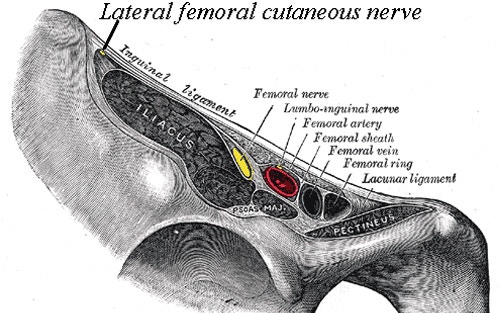Has that pain in your outer thigh made you unsure of your balance and afraid to take a step? What you are experiencing may be a condition called meralgia paresthetica, and with a few adjustments, you can be firmly on your feet in no time.

yourfootpalace.com gathered information about meralgia paresthetica, its symptoms, causes, diagnosis, and how to treat it.
What is Meralgia Paresthetica
Meralgia paresthetica is a medical condition resulting from the compression of either the right or left lateral femoral cutaneous nerve (LFCN), a sensory nerve to the skin on the outer thigh.
Meralgia Paresthetica Symptoms
While the symptoms of meralgia paresthetica may vary from person to person, the following are common indicators of the condition:
• Pain or discomfort along the outer thigh, sometimes extending to the knee
• Stabbing, burning, aching, tingling, or numbness in the thigh
• Shakiness or instability when standing after long periods of sitting or lying down
• Worsening pain after walking or standing for long periods
• Worsening pain when the thigh is lightly touched
• Pain occasionally spreading to the groin and buttocks
While meralgia paresthetica can occur on both the right and left sides of the body, it occurs most commonly on only one side or the other.
Meralgia Paresthetica Causes
This condition is caused when the right or left LFCN has been compressed or squeezed. Compression of this nerve can occur due to:
• Obesity or weight gain
• Wearing a heavy utility or tool belt
• Scar tissue from injury or surgery near the inguinal ligament
• Wearing tight clothing like belts, corsets and tight pants
• Pregnancy
• Complications from diabetes
• Accidents or injuries involving the hip area
• Seatbelt injury from an automobile accident
• Exposure to lead paint
• Age (those between the ages of 30 and 60 are at higher risk)
This nerve usually passes from the spine, through the groin area, and to the upper thigh without trouble. But when the LFCN becomes trapped – often under the inguinal ligament, which runs along the groin from the abdomen to the upper thigh – meralgia paresthetica can occur.

For most, retracing steps and actions to pinpoint the cause of a physical ailment is a crucial step to prevent its reoccurrence. With meralgia paresthetica however, this may not be so easy. Compression of the LFCN may not be felt immediately, and symptoms may slowly increase in intensity.
Meralgia Paresthetica Diagnosis
In the majority of cases, your primary care physician can diagnose meralgia paresthetica by performing a physical exam and evaluating your medical history. You may be asked to describe the pain and identify the affected area of your thigh.
The following tests may be administered to rule out other causes of the symptoms:
• Reflex testing
• Strength testing
• Imaging studies
• CT scan or MRI (when a tumor is suspected)
• Electromyography (measures the electrical discharges produced in muscles)
• Nerve conduction study (electrodes are placed on the skin to stimulate the nerve)
• Nerve blockade (involves an anesthetic injection into the thigh)
Once correctly diagnosed, a focused treatment plan can begin.
Meralgia Paresthetica Treatment
In most cases, meralgia paresthetica symptoms will ease after 6 to 8 weeks. During that time, treatment focuses on relieving nerve compression by:
• Losing excess weight
• Wearing loose clothing
• Using OTC pain relievers (as suggested by a pharmacist or primary care physician)
• Avoiding strenuous exercises
• Avoiding long periods of standing or walking

If symptoms persist longer than 8 weeks or the pain is severe, treatment may include:
• Corticosteroid injections that reduce inflammation and temporarily relieve pain.
• Tricyclic antidepressants. This type of medication might relieve pain.
• Gabapentin (Gralise, Neurontin), phenytoin (Dilantin), or pregabalin (Lyrica). These are anti-seizure medications that might help lessen painful symptoms.
Surgery is rarely performed to decompress the nerve and is only considered for people with severe and long-lasting symptoms.
Leg Pain and Meralgia Paresthetica
Leg pain caused by meralgia paresthetica can make you second guess your upright stability and increase the chances of injury by falling.
In this article, you discovered what meralgia paresthetica is, how to identify its symptoms, understand its causes, how doctors reach a diagnosis, and how to treat it.
Your procrastination to see a doctor when you experience severe or debilitating leg pain puts you at risk of exacerbating not only meralgia paresthetica but any underlying and potentially grave illnesses or conditions.
Sources:
https://rarediseases.info.nih.gov/diseases/9417/meralgia-paresthetica
https://my.clevelandclinic.org/health/diseases/17959-meralgia-paresthetica
https://www.mayoclinic.org/diseases-conditions/meralgia-paresthetica/diagnosis-treatment/drc-20355639
(706) 521-5290
(678) 963-5958